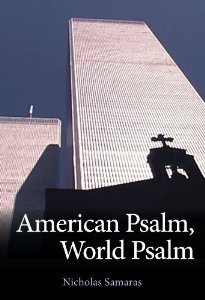Poets have long been interested in the biblical psalms, and with good reason. The psalms are written in poetic form and read like poetry even in translation. They cover the range of human emotions, from happiness and gratitude all the way to depression. The psalms also seem to be voiced by real people, people with questions, fears, demands, courage and cowardice. And the psalms are also set in a historical context, many of them dealing with the place of the psalmist in society and the place of the psalmist before God.
Two decades have passed since poet Nicholas Samaras published Hands of the Saddlemaker (reviewed here at Tweetspeak in 2011). He’s continued to publish poems and articles in literary publications, edited books, and contributed to anthologies. Now he has brought together 150 poems in a volume entitled American Psalm, World Psalm.
One hundred and fifty poems. One hundred and fifty psalms. It’s a big collection, an ambitious collection, a statement on history, private life, faith and religion, and American and world culture, and how the individual maneuvers through all of it. Each poem is in the form of a psalm; each poem, in fact, has a title and a “numbered psalm” designation.
One example of how Samaras fuses all of these themes is the psalm numbered 35:
Lord, I want no cursing from the ancient psalms.
I don’t pray for any child to have to pay
a bad price for bad parents.
I don’t wish for any sins of the fathers
to be visited upon their generations. Let the innocent
bear only the reward of their innocence.
Instead, I petition only that all offenders
be reminded of their sins every hour.
Let the selfish be haunted by their ways.
Let their eye-sockets grow dark and hollow.
The absence of the Lord’s presence is a far worse
punishment than anything accomplished by smiting.
I don’t focus on a God of vengeance.
I don’t want revenge on my enemies—
no broken teeth, no gnashing of physical pain.
I wish the death of no one. I wish the harm of no one,
but that the Lord lead the wicked
only to repentance and a changed heart.
The gutter of their own lives is punishment alright.
But only let them realize this.
Let them inherit a living death called insight.
In this one poem is the recognition of some of the realities of modern life and culture, the understanding of how consequences can be passed through generations, the individual seeking to shrink back from these consequences and find a more acceptable alternative, the modern understanding and definition of self-awareness, and all within a context of faith and belief.
In these poems, the poet addresses his relationship to God and belief; prayer, the human heart; the desire for solitude (the 138th psalm refers to the “tilling of the soul”); seeking to understanding some of the horrors of modern life; the meaning of America (the 119th psalm is the longest in the collection and is above everything that is, and isn’t, America); nature; and a series of poems in grace, benediction, singing, invocation, and more.
And there are psalms about Samaras’s father, Kallistos Samaras, a bishop in the Greek Orthodox Church. He expresses no angst, no broken relationship here, but instead a depth of love and gratitude for what his father has done for him: “I remember to thank the Lord for my father. / Because a good father’s soul is the love of God.” The poem is as refreshing as it is beautiful.
These psalms are meditative poems, poems than in many cases could be spoken as prayers. In all cases they are poems that speak to the human heart.
Image by Kevin Dooley. Sourced via Flickr. Post by Glynn Young, author of the novels Dancing Priest and A Light Shining, and the just-published Poetry at Work (T. S. Poetry Press).
__________________
Want to brighten your morning coffee?
Subscribe to Every Day Poems and find some beauty in your inbox.
- Longfellow’s “Paul Revere’s Ride”: Creating a National Legend - April 17, 2025
- Poets and Poems: Katie Kalisz and “Flu Season” - April 15, 2025
- Poets and Poems: Michelle Ortega and “When You Ask Me, Why Paris?” - April 10, 2025


Martha Orlando says
This sounds like a fantastic collection and one I would truly love to read. Thanks, Glynn!
Maureen Doallas says
Fine review, Glynn.
SimplyDarlene says
How interesting and beautiful, all at once.
By the way, ever since I read Claire’s book and your newest release, sir Glynn, I’ve been summarizing my morning Bible study times by way of the haiku. It’s been quite a journey to fill an otherwise studious-laden journal with poetical recaps. Insightful and precise.
As always, thank you for your reviews.
Blessings.
Mary Sayler says
As a Christian poet, I’ve been especially interested in Psalms – the prayer book,song book, and book of poetry read by Jesus and the early church. Other members of our Christian Poets & Writers group on Facebook will surely be interested in your post too, Glynn, so I’ll highlight it on the Christian Poets & Writers blog – http://christianpoetsandwriters.blogspot.com . Thanks and blessings.
Linda says
This is a wonderful review Glynn. During the darkest season of my life the Psalms were like a life-line for me. I couldn’t pray, but I could read the Psalms.
It sounds like a unique book.
nance.mdr says
the world
needs psalm
the world
needs calm
words
for the soul
to sing
Katie says
Yes, yes, yes:)
Thank you for sharing!